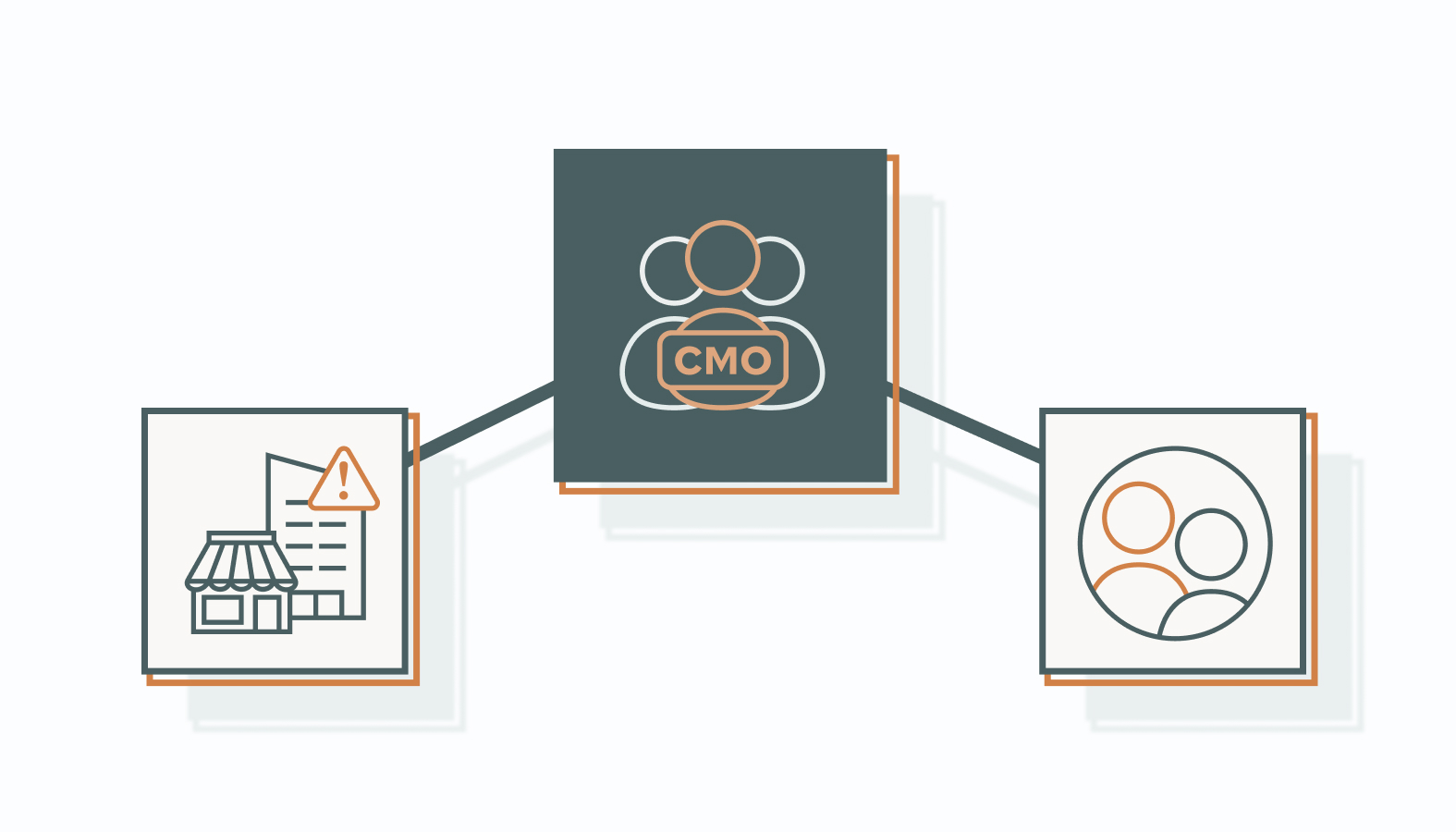Hiring a Chief Marketing Officer (CMO) is a big decision, often feeling like a choice between agility and deep strategic integration. Both fractional and full-time CMOs offer distinct advantages, but what works for one business might not work for another. Marketing leadership isn’t one-size-fits-all, and choosing the wrong model can significantly impact your growth.
That’s why we’re breaking down the structure, cost, involvement, and impact of each type of CMO for you. So, whether you’re running lean or planning for the next big leap, by the end, you’ll know which path best supports your business goals.
Exploring the Roles of CMOs
CMOs don’t just lead marketing — they shape momentum. The question is, do you need someone embedded in your business every day or a strategic powerhouse who drops in with focus and flexibility?
What a Fractional CMO Brings to the Table
A fractional CMO is a highly experienced marketing executive who partners with companies part-time. They offer enterprise-level insight without the overhead of a full-time salary.
Fractional CMOs operate under flexible engagement models (some allocate set hours weekly, others manage specific projects with clear deliverables). Doing this allows businesses to access senior-level marketing direction while staying nimble.
They deliver focus, speed, and experience exactly where it counts, making them ideal when you’re:
- Launching a new initiative
- Navigating a significant business transition
- Building a scalable marketing foundation
Responsibilities of a Full-Time CMO
A full-time CMO, on the other hand, is embedded in the company’s day-to-day rhythm. Their focus goes beyond individual campaigns; they shape and execute the entire marketing vision in alignment with long-term business goals.
This role calls for deep involvement across departments. From brand positioning and lead generation to customer retention and revenue forecasting, the full-time CMO is a cornerstone of organizational strategy and continuity, with responsibilities often including:
- Brand positioning and development
- Lead generation strategies
- Customer retention initiatives
- Revenue forecasting and budget management
- Ensuring marketing cohesion across all efforts
- Steering initiatives with both a strategic lens and operational command
- Participating in key business decisions
Comparing Fractional and Full-Time CMOs
Here’s a direct comparison of fractional and full-time CMOs, highlighting their core differences.
Employment Structure & Flexibility
A fractional CMO operates like high-level marketing on demand. They plug into your business on a part-time or project basis, giving you senior-level expertise without the full-time overhead. This model is a smart move for startups, scale-ups, or businesses navigating transition periods where flexibility matters more than permanence.
In contrast, a full-time CMO becomes fully embedded in the organization. They’re part of the day-to-day rhythm, steering long-range strategies and overseeing execution from the inside out. For companies that need constant alignment across departments and deep brand stewardship, full-time leadership offers that consistency.
Choosing the right model starts with an honest assessment of your team’s horsepower needs and how often they need it.
Cost vs. Continuity
Budgets tell their own story. Fractional CMOs often represent a more cost-efficient option. You’re paying for targeted time and impact, not full-time salary packages with benefits and bonuses baked in. For lean teams or companies investing heavily in other areas, it’s a way to unlock top-tier thinking without breaking the bank.
A full-time CMO, on the other hand, is an investment in continuity. They carry long-term responsibility for brand, demand generation, team development, and cross-functional alignment. They involve a higher cost but also deeper involvement and strategic oversight. Larger organizations or those managing multiple product lines may find the value worth the price tag.
Strategic Expertise and Influence
Both roles bring serious marketing chops, but their operating methods differ.
Fractional CMOs tend to be seasoned experts with broad exposure to different industries and models. They bring a fresh perspective, sharp instincts, and quick wins — especially valuable for focused initiatives like go-to-market strategy, rebranding, or digital transformation.
Full-time CMOs take a different approach. Their strength lies in sustained leadership, guiding strategy over time with deep knowledge of company culture, market position, and internal dynamics. Their influence is less about the spark and more about the steady flame that shapes long-term growth.
Cultural Fit and Leadership Integration
No matter how good a CMO is on paper, if they don’t click with the team, it won’t work. Fractional CMOs need to adapt quickly, blending external expertise with internal priorities. Their success often depends on strong onboarding, clear communication, and defined outcomes.
Full-time CMOs, meanwhile, have time to immerse themselves. They build relationships, mentor teams, and align with the company’s ethos. Their integration is slower but deeper, which can be a strong asset in change management or complex organizational environments.
Deciding on a Fractional CMO
Fractional CMOs thrive in environments that demand strategic oversight with built-in flexibility. They offer customized leadership that adjusts to the company’s size, goals, and growth stage while delivering executive-level decision-making without the long-term cost.
Startups and Small Businesses: Big Impact, Smart Budget
Startups and SMEs often face a familiar dilemma: they need marketing leadership but can’t justify the expense of a full-time CMO. This is precisely where a fractional model shines.
Imagine a startup preparing to launch a new SaaS platform. Instead of hiring an in-house CMO, they bring in a fractional expert who builds the go-to-market strategy, aligns the team, and sets the stage for growth. The company gets senior-level strategy and execution without burning through runway capital.
Fractional CMOs are particularly valuable in these fast-paced settings, where agility and speed are non-negotiable. They flex to match growth, scaling their involvement up or down as needed.
Project-Based Precision
Fractional CMOs also deliver serious value in project-driven scenarios. Whether it’s a rebrand, a market entry, or a digital overhaul, these leaders bring specialized expertise to see the initiative through from concept to completion.
Consider a mid-sized company expanding into a new international market. A fractional CMO brings the right mix of cultural insight, market strategy, and execution rigor to make that expansion successful without locking the company into a long-term contract.
One retail brand tapped a fractional CMO to oversee its e-commerce transition. With deep digital marketing experience, the CMO mapped out a new sales funnel, optimized ad spend, and coached the internal team on best practices. This resulted in a sharp increase in online revenue without requiring a bloated payroll.
Strategic Fit, Scalable Value
When used strategically, a fractional CMO can bridge the gap between vision and execution. They offer clarity, consistency, and high-value leadership that aligns marketing operations with business goals. Companies that leverage this model save money and unlock strategic capacity exactly when and where it matters.
When Full-Time CMO Makes Sense
Full-time CMOs excel in environments where marketing is mission-critical and deeply integrated into overall operations. They’re not just there to steer the ship; they help design it, staff it, and navigate market waters before the forecast changes.
Best Fit: Large Corporations with Layered Needs
Complexity is the norm in enterprise settings: Multiple product lines, global campaigns, and cross-functional collaboration. It’s a lot to juggle. A full-time CMO has the bandwidth and authority to keep all those parts moving in sync.
Take a multinational consumer goods brand. Their marketing spans continents, languages, and channels. A full-time CMO ensures global strategy aligns with local execution, safeguarding brand consistency while adapting to regional market dynamics. That kind of orchestration requires someone with a full-time focus and cross-functional leadership skills.
Strategic Consistency at Scale
Big-picture growth doesn’t happen with fragmented thinking. A full-time CMO brings long-term vision into daily execution. They align brand, demand generation, customer experience, and digital transformation under one cohesive strategy.
Picture a tech firm aiming to double its market share over the next ten years. That’s not a quarterly project but a strategic marathon. A full-time CMO designs and executes a roadmap that supports this expansion, integrates new channels, and recalibrates messaging as the competitive landscape shifts. Their continuity keeps the team-centered, even as goals scale up.
Case in Point: Digital Transformation at a Global Scale
One pharmaceutical company brought in a full-time CMO to lead its global digital marketing overhaul. What followed is a sharp rise in digital engagement, broader market share, and unified brand messaging across global territories. It wasn’t magic. It was leadership, consistency, and a forward-thinking strategy reinforced every day.
A full-time CMO isn’t overkill for every business. However, for companies with high stakes, high complexity, and high growth ambitions, they provide the kind of consistent leadership and strategic alignment that fractional roles can’t sustain. Know when you need that level of firepower, and don’t hesitate to bring it into the room.
Key Factors in Choosing the Right CMO
Picking a Chief Marketing Officer demands more than a gut feeling. This is a high-stakes leadership choice, and it requires a clear-eyed approach. Knowing the key factors will help you lock in a leader who drives impact and fits your company like a tailored suit.
Start with Your Business Needs
The best move is to define your business needs from a CMO. Take stock of your marketing challenges and ambitions.
Are you breaking into new markets? Trying to sharpen your digital edge? Or maybe you’re scaling up fast or aiming for steady, sustainable growth.
Pinpointing these will map out the skills and experience your next CMO must bring to the table.
Don’t overlook company culture. A CMO who vibes with your team and shares your values creates a workspace that energizes everyone and drives results naturally.
Evaluate Candidate Fit
When it comes to vetting candidates, experience is your baseline. Consider these key factors:
- Experience: Look for proven success in roles that directly align with your specific goals.
- Leadership Style: Ensure they can inspire, adapt, and confidently lead while syncing seamlessly with your company culture.
- Strategic Vision: Seek a forward-thinker capable of crafting and executing strategies that align with your long-term ambitions.
- Cultural Fit: Go beyond resumes with in-depth interviews to reveal their leadership approach and how well they integrate with your team.
- Track Record: Use reference checks for real-world context on their past performance.
- Problem-Solving: Consider scenario exercises or case studies to see how they tackle challenges specific to your business.
Pinpointing your business needs and rigorously assessing candidates ensures you don’t just fill a role. You bring on board a CMO who propels your company forward, delivering measurable growth today and building resilience for tomorrow.
Finding the Marketing Leader That Fits Your Business
Ultimately, choosing between a fractional and full-time CMO comes down to aligning your company’s leadership style with its unique needs and growth plans.
Simply put,
- Fractional CMOs offer targeted expertise and flexibility. It’s ideal for businesses seeking senior guidance without a full-time commitment.
- Full-time CMOs provide the deep integration and sustained leadership essential for complex operations or rapid scaling.
The key is to honestly assess your priorities, resources, organizational structure, and growth ambitions to select the marketing partner who will drive momentum and deliver consistent results. When marketing leadership aligns with business goals, your company is positioned to thrive.
Ready to Make the Right CMO Choice for Your Business?
Whether you need agile, on-demand expertise or a dedicated marketing captain steering your company every day, the choice you make now can shape your business’s future success. If you’re weighing your options and want a clear, personalized perspective, we’re here to help.
Schedule a candid conversation with one of our experts for an open, no-pressure discussion about which CMO model suits your unique goals and challenges. Let’s explore how to unlock the right marketing leadership for your growth journey.








